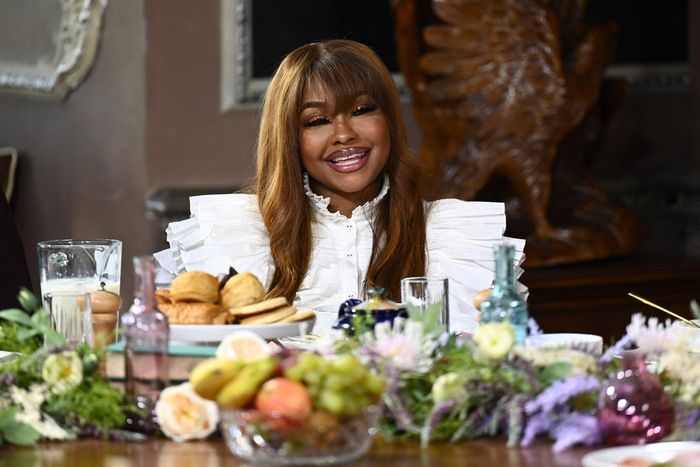
Low-key one of the biggest stories of this year’s Primetime Emmy nominations was in the Outstanding Reality Competition Category, where perhaps the single most impenetrable fortress on the ballot was infiltrated by a newcomer. Peacock’s The Traitors became only the ninth show in the last five years to be nominated for the only Reality TV award that gets presented on the main Emmys telecast (as opposed to the Creative Arts Emmys, at which another 20-plus awards will be handed to reality shows). It’s a category that has, since its inception in 2003, only seen five different winners. Yet here’s The Traitors, nominated in this category for the first time and even favored by some to win. How did Peacock find a crack in the wall, and what’s the secret to The Traitors’ Emmy success?
For starters, Peacock campaigned the heck out of it. Throughout the nomination balloting period, I heard from several awards-cognizant folks living in L.A. who commented on how many Traitors billboards they were seeing, and how unusual it is for reality shows to campaign that heavily. Press events featured the show’s loquacious host Alan Cumming and long-awaited reunions for rival cast members Phaedra Parks and Dan Gheesling. One event saw Peacock essentially take over a portion of L.A.’s open-air shopping center The Grove, complete with a replica of the show’s imposing roundtable and little chalk slates for voting. “There were a few people who wandered in the ‘Traitors Castle Garden’ who seemed to have no idea what show had brought them there,” the Ankler’s Katey Rich, who was in attendance, tells me. “Were any of those people potential Emmy voters? Probably not. But it seems like in FYC season every little bit of publicity counts.”
But the bigger clue to The Traitors’ Emmys glow-up this year might lie in the show’s smaller-scale success last year. Season one got a lonesome nomination in 2023, for Outstanding Casting for a Reality Program. But lo and behold, season-one casting director Erin Tomasello won that Emmy, beating out favored shows like RuPaul’s Drag Race and Queer Eye. That casting win feels like the ultimate precursor for The Traitors leveling up in nominations this year. With a noticeable increase in promotion from Peacock along the campaign trail, The Traitors pulled in five nominations, including Outstanding Host for Cumming and that coveted Outstanding Reality Competition nod, and seems to be the only real competition for five-time winner RuPaul’s Drag Race. It’s not surprising that it all started with a casting award, since reality shows live and die by their casting alchemy.
“Everything starts with casting,” says Traitors producer Sam Rees-Jones. “With The Traitors, the attention to detail that we put into pre-production is vital to the success of the show. We set out the game, we’ve created the world, and then we hand the set of rules to the players. We need to get the top half right, because once they’re in the castle, the game is theirs to play.”
Getting that top half right means populating the house with contestants who will take the game’s fairly loose premise — figure out who the Traitors in the castle are (unless you are one!) — and weed them out for a chance to win big money (the season-two pot ended with $208,100). If you are a Traitor, well, make sure your castmates don’t come to that conclusion. “We look for critical thinkers,” Tomasello adds, “or [people who are] good at reading others and crafting plans to deceive.” Season one, which was the only season of the U.S. version of The Traitors to incorporate non-reality-TV alums (i.e, normies), got a lot of mileage out of its interpersonal stories; the season’s emotional climax was rooted in the bond and ultimate betrayal of Andie Vanacore (a nonbinary 30-year-old Faithful) by Survivor’s Cirie Fields (51 years old and a Traitor).
The casting requirements for a social strategy show like The Traitors is but one highly specific example of what goes into populating a reality show. And that’s because “reality TV” isn’t so much a genre but an umbrella under which many genres of TV shows exist. Tomasello, whose career in casting has included an array of reality subgenres, from cooking shows (Master Chef) to talent shows (Shear Genius) to social strategy (The Circle), says casting requires an ability to “wear a different hat” for each show. “I could tell you everything about being a home cook. I could tell you all the inner workings of what happens in a salon and the drama of that from Shear Genius and Tabatha’s Salon Takeover. Whatever you’re working on, you dive into the culture of it so that you can speak the language of the people you’re talking to.”
At the Emmys, casting directors have been honored in one way or another since 1991 (compare that to the Motion Picture Academy, whose casting category will launch with the films of 2025). Currently there are four casting awards, for comedy, drama, limited series, and reality TV. This three-to-one imbalance feels wrong, not only considering the sheer volume of unscripted shows on TV but also because there are so many different types of reality shows. Take this year’s Outstanding Casting for a Reality Program nominees. The Amazing Race requires casting directors to pick pairs who will stand up under the pressures of global travel but aren’t so unflappable that they’re boring; Drag Race is a talent-based series that exists within a much larger drag subculture, and the queens cast for the show are under immense pressure to live up to the highest standards. Squid Game: The Challenge began with 456 (!) players, easily the largest cast in reality-TV history, and each one had to be selected as if they’d be the one standing.
It’s this vastness of difference between show types that has led Tomasello, in her capacity as an Academy member, to work toward opening up the Reality Casting category. “I’m trying to let an unscripted casting voice be heard, so that, like our scripted counterparts, we get the proper categories. What I would like to eventually see is unstructured, structured, and competition categories.” This way, she says, you wouldn’t get Love on the Spectrum competing against Amazing Race. Without giving away who she might be voting for, she sees Love on the Spectrum as a show that accomplishes all of the casting requirements she tends to look for in an unstructured series: “the personality, the charisma. Are the contestants engaging, interesting? Are they dynamic? Are they quirky? Are they relatable?” She also singles out The Golden Bachelor for its work in casting the kinds of people (in this case: older) that you don’t often see on reality competitions.
The reality TV categories at the Emmys are still relatively new in the grand scheme of things. “Outstanding Reality Program” was introduced in 2001 for shows like the documentary-style American High and the late-night HBO staple Taxicab Confessions. “Outstanding Reality Competition” arrived in 2003 to accommodate the Survivor/Amazing Race wave of shows. It wasn’t until 2014 that Outstanding Reality Program was split into Structured and Unstructured categories. If you have a free afternoon, you can peruse the Emmys bylaws to clarify what defined structured versus unstructured, but basically, per the Emmys 2024 rules and procedures, structured shows:
contain story elements that mostly adhere to a recurring structured template. Storytelling may be self-contained within episodes or carry-over between episodes, and generally must be bound by specific, consistent benchmarks or prescribed templates within a standardized pattern of action. These might include presentations, regular tasks, evaluations, interviews, reveals, resolutions, discoveries, explanations, dialogue, etc.
In other words: Love Is Blind, Shark Tank and Queer Eye, which follow a recurring format but which aren’t, strictly speaking, competitions. Diners, Drive-Ins and Dives also seems to count, since it’s been nominated eight (!) times, though that show’s structure is a bit looser.
Unstructured reality, meanwhile, is:
for programs that contain story elements driven by the actions of civilian and/or celebrity participants and lacking a consistent, structured template and standardized pattern of action. Unstructured elements generally depict the activities, desires, life journeys and goals of characters, highlighting personalities, relationships, occupations, tasks, projects, etc. Storytelling may be self-contained within episodes or carry-over between episodes, but they may not be bound by specific, consistent benchmarks and/or prescribed outline.
So Bravo’s The Real Housewives and Below Deck franchises and shows like Netflix’s Selling Sunset, HBO’s We’re Here, and FX’s Welcome to Wrexham.
Meanwhile, craft categories have been routinely split to reflect the different genre requirements that go into them. Choreography was split into reality and scripted categories in 2019. Outstanding Cinematography for a Reality Program was spun off from Cinematography for a Non-Fiction Program in 2006. The editing categories were split between structured and unstructured reality shows in 2016. An effort to similarly diversify the casting category seems both sensible and likely to succeed, sooner or later.
But it won’t make the kind of headlines a more galaxy-brained development — like instituting a category for Outstanding Reality Show Cast Member — might. The idea isn’t without precedent. The Critics Choice Real TV Awards have a category for “Ensemble Cast in an Unscripted Series,” as well as “Male Star of the Year” and “Female Star of the Year,” which have both included reality cast members in the past (Vanderpump Rules’s Ariana Madix is, perhaps inevitably, the reigning champion). Perhaps an Emmy for Outstanding Reality Show Cast Member opens up too much of a can of worms; the chaos of a category where Roxxxy Andrews, Liz the Applebees Enthusiast from Survivor, Gerry the Golden Bachelor, JaNa from Love Island, and Nurys from the most recent season of The Challenge all hit the Emmys campaign trail at the same time could be too chaotic for the buttoned-up Academy types. But it would also rocket to the top of the list of most interesting Emmy categories.


